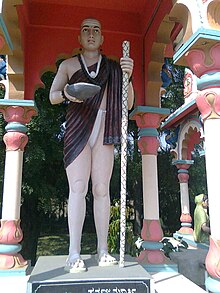Sarvajna
Sarvajña (Sanskrit for "all-knowing", Kannada: ಸರ್ವಜ್ಞ) was poet, moralist, philosopher and saint who is conjectured to have lived in the late 16th century (1570) in Karnataka, India. His real name is inferred as Pushpadatta and his pseudonym as Sarvajna. His fame is attributed to his pithy three-liner poems which are called tripadis. There are in the form of Vachanas meaning “that which is said". Sarvagna was a wandering monk who wrote the Tripadis; about 2000 three-liners are attributed to him. The popularity among people to these three-liners is due to its alliterative structure and simplicity. The themes covered have social, ethical and religious import. There are also a number of riddles penned by him. His poems end with the signature as “Ankitanaama”.

Quotes
editTripadis
editTranslated version from poems in the original Kannada languageSarvagna Kavi: Biographical notes. Ourkarnataka.com. Retrieved on 21 November 2013.Sarvagna Vachanagalu: Tripadi with translation, transliteration and explanation.. Google.com. Retrieved on 21 November 2013.
- A service without flowers, the king without a horse and friendship with one who does not know the language are a waste.
- While borrowing it is like eating a meal of milk and honey. When the loan is due to be paid, it feels as if the bones in the body are broken.
- A drunkard is like a pig. The poor pig, however, is helpful. The drunk is worse and useless.
- What is the use of circling round the temple without any feeling? It is like the ox which circles round the oil crusher.
- What use is giving advice to a fool a hundred times? It is like raining on a rock for hundred years. Will it ever soak in?
- If fools claim that they jumped over six mountains, agree to it. It is not worth fighting over.
- For one who knows how to speak, it is like water pouring out of Eta [a device to draw water from a well]. For one who does not know, it is just the rope hanging down.
- Learn some things from those who know; Watch some things from those who do; Learn other things by self experience.
- Offering food [to the hungry], telling the truth and putting others above oneself is a happy way to heaven.
- A wife who keeps the home warm, watches expenses, knows what is on your mind and acts accordingly is everything. Who cares if the heavens catch fire!
- One who gives [alms] without advertising is superior. One who gives and talks about it is medium. Only a knave talks much and gives nothing.
- The company of good men is like enjoying sweet honey. The company of evil men is like the stinking stuff in the sewer.
- By wearing a mark of ash one were to reach heaven, a donkey (that rolls in ash) should reach there surely.
- By dipping in the river everyday a Brahmin were to jump to heaven, the frog which is born and lives in water should surely go to heaven.
- By dabbing sandalwood paste on the forehead one were to reach heaven, the stone used to grind the paste should be first to go there.
- No one knows everything. The learned are few. There is no guarantee that the smart bring wisdom. Knowledge is not available for all.
Flowers of Wisdom
editP.C. Babu (1 January 2003). Flowers Of Wisdom. Discovery Publishing House. pp. 243–. ISBN 978-81-7141-695-0.
- One who makes a gift to the deserving and needy attains the everlasting abode of Shiva.
- There is no god greater than Annam [food]. No one can survive without annam, give annadanam (donate food)and save the lives of the hungry.
- Some eat animals, some eat the plants. None can survive without eating either of them. The doctrine of Ahimsa is difficult to sustain.
- Control over one’s tongue, and good conduct enhance one’s prestige.
- A crow when it sees some foodstuff, it crows, gathers other crows and shares it with them. Crows and fowl have a better social etiquette than a man.
- A fool boasts about what little he knows. A wise man keeps quiet about what he knows and is safe.
- One who walks a hundred feet in a cool breeze after his meal and one who sleeps on his left side will never need a physician.
- From woman comes the new life on earth and woman is the source of all prosperity here and hereafter.
- Worship without a symbol, a garden without a source of water, and the household affairs of one without a woman, all these are doomed to fail.
- Truth leads one to glory now and forever. In this world truth and falsehood are found confusedly mixed yet it is truth alone that triumphs here and hereafter.